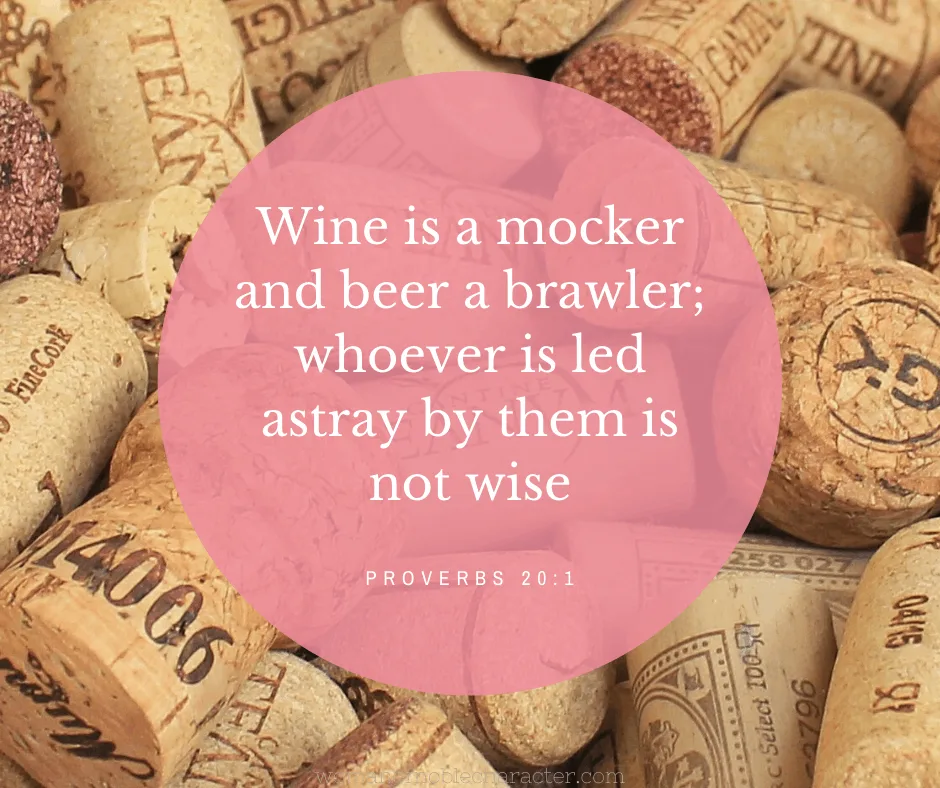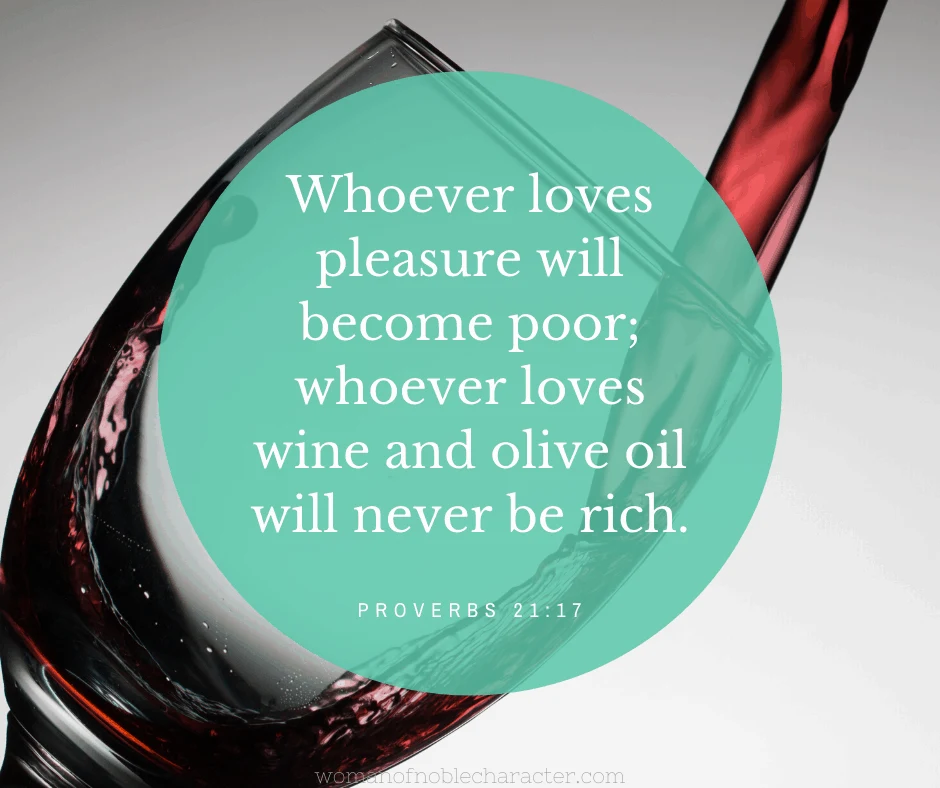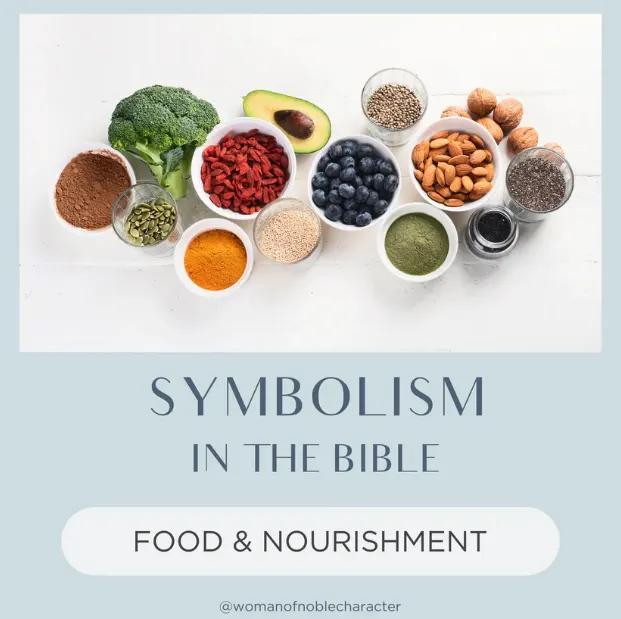This page/post may contain affiliate links. As an Amazon Associate, as well as an affiliate of other programs, this means if you purchase something using these links, I will receive a commission on qualifying purchases at no cost to you! For more detailed information, please visit our Affiliate Disclaimer page
In biblical times, water was often scarce, so wine became a necessity rather than a luxury. It was equated with life.
(For other food symbolism in the Bible, see these posts: Milk in the Bible and Bread in the Bible)
Wine, along with grain and oil represented Gods covenant blessings promised to Israel for obedience. We also see God withholding those necessities for disobedience.
Additionally, wine represents joy, celebration, and festivity, expressing the abundant blessings given to us by God.

Wine, in the Bible (as today) can be both good and bad. It can be abused or made an idol of and cause a person to make poor decisions or lose control.
In Proverbs 20:1, we read:
“Wine is a mocker and beer a brawler;
whoever is led astray by them is not wise.” – Proverbs 20:1
And in Ephesians 5:18 (one of my favorites)
“Do not get drunk on wine, which leads to debauchery. Instead, be filled with the Spirit,” – Ephesians 5:18
At the wedding in Cana, when Jesus turned water into wine, he provided just the right amount for people to enjoy, without getting drunk.
Wine can represent love between neighbors and the good of faith. We can see examples of this when we look at the Holy Supper:
“And he took bread, gave thanks and broke it, and gave it to them, saying, “This is my body given for you; do this in remembrance of me. In the same way, after the supper he took the cup, saying, “This cup is the new covenant in my blood, which is poured out for you.” – Luke 22:19-20
Wine is also seen in conjunction with sacrifices. Meat offerings signify the good of love and wine offerings the good of faith.
Here are some biblical examples of wine during sacrifices:
“With the first lamb offer a tenth of an ephah of the finest flour mixed with a quarter of a hin of oil from pressed olives, and a quarter of a hin of wine as a drink offering.” – Exodus 29:40
“together with its grain offering of two-tenths of an ephah of the finest flour mixed with olive oil — a food offering presented to the Lord , a pleasing aroma — and its drink offering of a quarter of a hin of wine.” – Leviticus 23:13
“then the person who brings an offering shall present to the Lord a grain offering of a tenth of an ephah of the finest flour mixed with a quarter of a hin of olive oil. With each lamb for the burnt offering or the sacrifice, prepare a quarter of a hin of wine as a drink offering. – Exodus 29:40
“‘With a ram prepare a grain offering of two-tenths of an ephah of the finest flour mixed with a third of a hin of olive oil, 7 and a third of a hin of wine as a drink offering. Offer it as an aroma pleasing to the Lord.” Numbers 15:4-6
More examples that wine signifies love toward the neighbor and the good of faith, is also found in these verses:
“Come, all you who are thirsty,
come to the waters;
and you who have no money, come, buy
and eat!
Come, buy wine and milk
without money and without cost.” –
Isaiah 55: 1
Without mutual love and good of faith is described in the verse regarding a winepress and wine in Jeremiah.
“I weep for you, as Jazer weeps, you vines of Sibmah. Your branches spread as far as the sea they reached as far as Jazer. The destroyer has fallen on your ripened fruit and grapes. Joy and gladness are gone from the orchards and fields of Moab. I have stopped the flow of wine. –
from the presses; no one treads them with shouts of joy.
“Although there are shouts, they are not shouts of joy.” – Jeremiah 48:32-33
Are You a Foodie? Do you want to learn more about food in the Bible and its symbolism?
A guide to the symbolism of many foods in the Bible, including milk, honey, bread, and more. Looking at scripture to describe food in biblical times and what it represents in our spiritual life.
As mentioned above, wine signifies the good of mutual love and of faith, we see another example of this in John.
“Jesus said to them, ‘Very truly I tell you, unless you eat the flesh of the Son of Man and drink his blood, you have no life in you. Whoever eats my flesh and drinks my blood has eternal life, and I will raise them up at the last day. For my flesh is real food and my blood is real drink. Whoever eats my flesh and drinks my blood remains in me, and I in them.” – John 6:53-56

“ Then I heard what sounded like a voice among the four living creatures, saying, “Two pounds of wheat for a day’s wages, and six pounds of barley for a day’s wages, and do not damage the oil and the wine! ” – Revelation 6: 6
Biblical scholars conclude from this that where oil is the good of celestial love; and wine, the good of spiritual love.
Wine in the Bible as Medicine
We also find quite a few references to wine in the Bible as being used as medicine. For example, Paul, when writing to Timothy advises:
“To Timothy my true son in the faith … Stop drinking only water, and use a little wine because of your stomach and your frequent illnesses” – 1 Timothy 5:23
And, the Good Samaritan used wine to cleanse the wound of the traveler.
“He went to him and bandaged his wounds, pouring on oil and wine. Then he put the man on his own donkey, brought him to an inn and took care of him.” – Luke 10:34
The symbolism and use of wine in the Bible is significant, as you can see.
But now, let’s explore an often-asked question:
Was there alcohol in the wine in the Bible?
Biblical scholars continue to have significant controversy concerning the wine that Jesus made at the wedding feast (and other references to wine in the Bible.
The most common Hebrew word for wine is “yayin”, from a root meaning “to boil up,” “to be in a ferment.” Others derive it from a root meaning “to tread out,” and hence the juice of the grapes when stepped on or pressed.
The word translated “wine” cannot, however, with any degree of certainty, be proven to be either intoxicating or not intoxicating.
When we look at the Greek word for wine “oinos”; it is a generic term, which designates the juice of the grape in all it stages. (fermented, boiled up, etc.)
There are two main views on whether or not wine in the Bible was intoxicating or not intoxicating:
-
The Wine was NOT intoxicating.
This preposition is based mostly on the following arguments:
(a) The wine of the First Century was watered down (i.e. 3 parts water to 1 part wine) so they would have had to drink a considerable amount in order to become intoxicated. Rabbinic writing and literature frowned upon drinking undiluted wine: 2 Macc.15:39, which says “It is harmful to drink wine alone, or again, to drink water alone, while wine mixed with water is sweet and delicious and enhances one’s enjoyment.”
(b) Those of Biblical times frowned upon the abuse of wine. There are many scripture references that mention drunkenness or being tempted by wine or drink:
“When he drank some of its wine, he became drunk and lay uncovered inside his tent.” – Genesis 9:21
“Wine is a mocker and beer a brawler; whoever is led astray by them is not wise.” – Proverbs 20:1
“Whoever loves pleasure will become poor; whoever loves wine and olive oil will never be rich.” – Proverbs 21:17

“Woe to those who rise early in the morning to run after their drinks, who stay up late at night till they are inflamed with wine.” – Isaiah 5: 11-12
(c) In the New Testament there are additional verses pointing to the misuse of wine. These point to the teachings of the Old Testament:
“But now I am writing to you that you must not associate with anyone who claims to be a brother or sister but is sexually immoral or greedy, an idolater or slanderer, to drunkard or swindler. Do not even eat with such people.” – 1 Corinthians 5:11
“and envy; drunkenness, orgies, and the like. I warn you, as I did before, that those who live like this will not inherit the kingdom of God.” – Galatians 5:21
“Do not get drunk on wine, which leads to debauchery. Instead, be filled with the Spirit,” – Ephesians 5:18
“For you have spent enough time in the past doing what pagans choose to do — living in debauchery, lust, drunkenness, orgies, carousing and detestable idolatry.” – 1 Peter 4: 3
(d) Jesus would never do anything that would encourage sin and providing intoxicating wine would have encouraged drunkenness.
2) The second position is that THE WINE WAS INTOXICATING. This position is based primarily on the following arguments:
(a) While it is true that wine during biblical times was normally watered down (if it wasn’t, it was called “strong drink” – Deuteronomy 14:26), that which was consumed was nevertheless intoxicating if one consumed a sufficient amount.
(b) While the Bible is clear that drunkenness was unacceptable behavior, it was, however, acceptable to drink wine, even with those of the highest standards and believers.
(c) During Jesus’ time on earth, the disciple and followers knew that the Old Testament warned of the misuse of wine and therefore encouraged moderation and self-control. Drinking a small amount (similar to “social drinking” in modern society) would be acceptable.
We never want to make alcohol (or anything, an idol) and always need to practice self-control.
“But the fruit of the Spirit is love, joy, peace, forbearance, kindness, goodness, faithfulness, 23 gentleness and self-control. Against such things there is no law.” – Galatians 5:22-23
(d) God created many things for us that could be abused or misused. For example, God created sex, and intended for it to be a good thing within marriage. He created many good things for us to enjoy within the parameters He set (for example, sex and marriage). Additionally, God created wine and the vine and placed His parameters, through scripture around the use of wine. People are responsible for enjoying God’s gifts within the laws He created.
We know that Jesus Himself miraculously turned water into wine (John 2:1-11). He would never have done so if alcohol were a sinful substance never to be consumed. Alcohol acts as a preservative, so wine is to fruit juice as yogurt or cheese is to milk.
Everything we do should be in moderation. God’s Word clearly tells us that both drunkenness and gluttony are sinful.
Even when it comes to food. We cannot live without food, but we can live without drinking alcohol. Others refrain from alcohol as a choice or a show of self-control. But whether we drink moderately or abstain entirely is not the point. Our personal desires should not be a consideration. Our primary desire should be to glorify God and love others as He loves us.
“So whether you eat or drink or whatever you do, do it all for the glory of God. Do not cause anyone to stumble, whether Jews, Greeks or the church of God – even as I try to please everyone in every way. For I am not seeking my own good but the good of many, so that they may be saved. Follow my example, as I follow the example of Christ.” – 1 Corinthians 10:31-11:1
Wine in the Bible has many forms of symbolism and significance as well as numerous references. We learn so much from what the Bible tells us about everything in life, including food and wine.
Whether you choose to imbibe or not, read scripture and reflect on the powerful significance of wine in the Bible.
Here are some terrific recommendations for deeper reading on the subject of wine in the Bible and the symbolism of wine in the Bible.




Because of Him,
Sue

